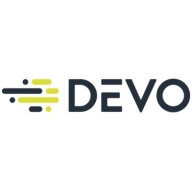

Fortinet FortiSIEM and Devo are competitive security information and event management solutions. Devo generally scores higher in terms of advanced analytics and scalability, while Fortinet FortiSIEM is praised for its pricing and support, making it attractive for budget-sensitive businesses.
Features: Fortinet FortiSIEM users frequently highlight its robust monitoring and alerting capabilities, customizable dashboards, and integration with a wide range of devices. Devo users value its real-time analytics, extensive data storage, and scalability. Although both have strong feature sets, Devo stands out for advanced data analytics and ease of handling large volumes of data.
Room for Improvement: Reviews suggest Fortinet FortiSIEM could enhance its user experience by simplifying its configuration process, improving reporting functionalities, and refining its interface. Devo could improve by providing more comprehensive documentation, better support for onboarding, and more integration options.
Ease of Deployment and Customer Service: Fortinet FortiSIEM is recognized for a straightforward deployment process with supportive customer service, yet some users note a steep learning curve. Devo's deployment is seamless, supported by prompt and effective customer service, offering more accessible onboarding and faster integration.
Pricing and ROI: Fortinet FortiSIEM is often deemed cost-effective with a favorable ROI by users, especially those in budget-sensitive environments. Devo, though more expensive, is considered to provide a higher ROI due to its advanced analytics and operational efficiencies. Customers generally agree Fortinet FortiSIEM offers good value for money, while Devo’s capabilities justify its higher cost.


Devo is the only cloud-native logging and security analytics platform that releases the full potential of all your data to empower bold, confident action when it matters most. Only the Devo platform delivers the powerful combination of real-time visibility, high-performance analytics, scalability, multitenancy, and low TCO crucial for monitoring and securing business operations as enterprises accelerate their shift to the cloud.
FortiSIEM (formerly AccelOps 4) provides an actionable security intelligence platform to monitor security, performance and compliance through a single pane of glass.
Companies around the world use FortiSIEM for the following use cases:
We monitor all Security Information and Event Management (SIEM) reviews to prevent fraudulent reviews and keep review quality high. We do not post reviews by company employees or direct competitors. We validate each review for authenticity via cross-reference with LinkedIn, and personal follow-up with the reviewer when necessary.